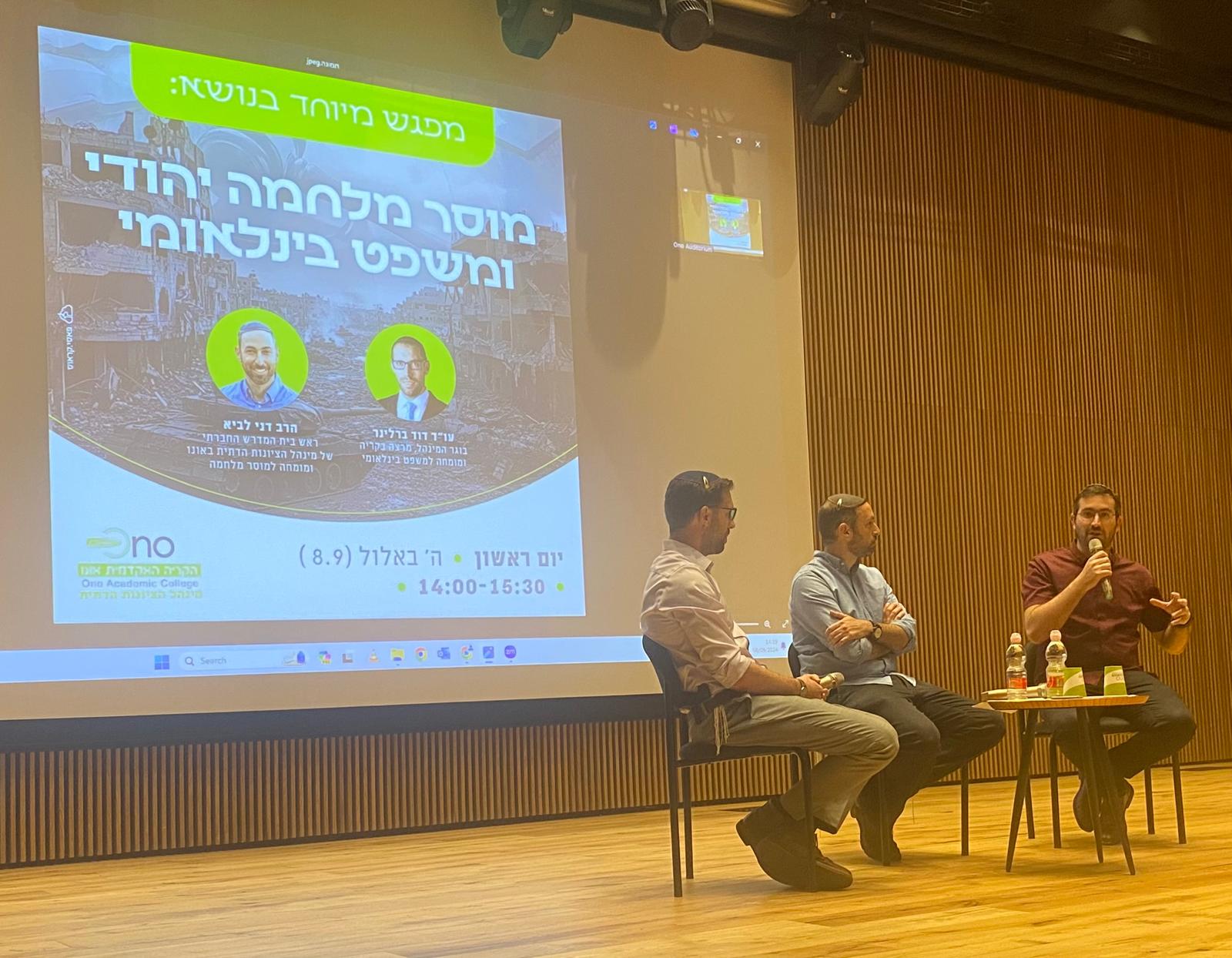Symposium – Jewish Ethics of War and International Law
Ono Academic College’s Religious Zionist Administration hosted a symposium on the topic of Jewish Ethics of War and International Law featuring, Rabbi Dani Lavi, the Director of Ono’s Beit Hamidrash and Adv. David Berliner, an Ono graduate and lecturer, and an expert in international law. Their conversation moderated by Noam Cohen of Ono’s Religious Zionist Authority addressed issues of Jewish war ethics, international law, and everything in between.
Rabbi Lavi began by asking a fundamental moral question about what do we do regarding evil in the world that seeks to kill others? The moral response is to try and prevent evil from succeeding before it acts. However, if you need to employ destruction to counter evil, you should destroy as little as possible while still winning. Some might ask, “If you are killing your enemy, are you no worse than he?” Rabbi Levi responded that fighting evil with violence is the required response and does not bring you down to the level of evil. Killing a terrorist is a moral action of the highest order.
Adv. Berliner presented a historical overview noting that the international laws of war are intended to reflect and underlying moral system. In a practical way, the rules of war that were agreed upon benefited every side. For instance, every army would benefit if a norm formed around not killing wounded or not executing hostages. The problem arises when.one or more sides doesn’t follow the rules. Before World War II, it was accepted that following the rules of war, was based on their even mutual application. However, after WWII, an idea arose that there are certain things you can’t do under any circumstances. In order to deal with a situation in which one side does not follow the rules of war, Berliner advises creating a hierarchy of values.
Rabbi Lavi addressed the problem of holding fast to a code of war, even when the other side does not, which Berliner had raised. He said that in our currently conflict, we have seen Hamas employ rape as a weapon of war. Similar behavior is taking place in Russia’s war with the Ukraine. Rape was widely employed as a weapon in World War II. However, we Jews decided 3000 years ago that rape is not a legitimate weapon of war. We don’t just trumpet this principle in theory. Over the course of the history of the Israel Defense Forces, there have been almost no recorded instances of rape. Lavi noted that he has asked many soldiers who have been fighting in Gaza if they feel that their values have been eroded. They told him the opposite has happened and they are sharpening their moral senses because the war requires them to make sensitive moral judgements every day. Lavi enthusiastically supported the soldiers’ tempering their instincts with a moral review but said they just need to remember to win as well.
The moderator, Cohen, asked the participants about the morality of preemptive strikes. Adv. Berliner said the problem is less one of international law than international politics. Many times, like prior to the 1967 Six Day War, Israel’s enemies (in this case, Egypt) had already taken actions that counted as acts of war. Therefore “pre-emption” in self-defense was clearly permitted. In other situations, international law says you can preempt if the enemy if it is right about to attack you.
However, the further away the threat is, the more problematic is the preemption. This is often more a political problem than one of international law. For instance, now, when Israel is faced with an Iranian nuclear program that will become actual existential threat at some unknown time in the future, countries and international institutions might oppose Israeli pre-emption.
Rabbi Lavi responded that Jewish law does not prohibit preemptive strikes. The opposite is true. The Gemara in Sanhedrin, commenting on the Torah law that clears a homeowner of killing an intruder who came into his home in the middle of the night saying, “If someone rises up to kill you, get up and kill him first.” This is also common sense, Lavi said.
Lavi went on to note that Western morality is influenced by ideologies that hold that the strong are evil and the weak are virtuous. Only after you have suffered a massacre do you have the right to respond. This is not the Jewish philosophy. It is an outrage to allow your people to be murdered before responding, he said.
Ono Academic College’s Religious Zionist Authority and its Lev Berliner Social Beit Midrash led by Beit Midrash Director, Rabbi Dani Lavi, conduct monthly study sessions open to all members of the Ono community.







